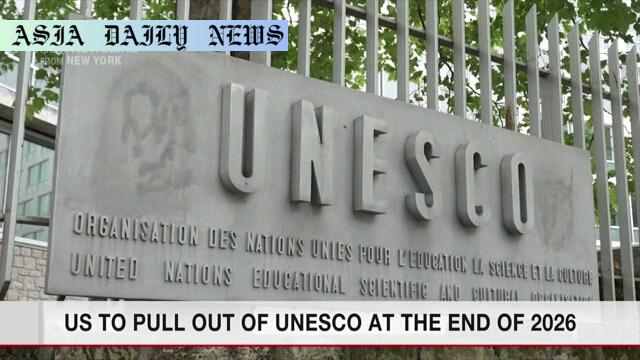UNESCO: The United States plans to leave UNESCO by Dec 31, 2026, citing cultural divisions, Palestine membership, and policy misalignment.
- The US announces withdrawal from UNESCO by December 31, 2026.
- US cites cultural divisions and Palestine’s membership as key reasons.
- UNESCO Director-General expresses regret but emphasizes reforms.

The US Decision to Withdraw from UNESCO
The United States has announced its decision to withdraw from the United Nations Educational, Scientific and Cultural Organization (UNESCO), effective December 31, 2026. This marks a significant development in US-UN relations, as the US State Department justified the move by citing concerns over the organization’s policies and cultural priorities. According to spokesperson Tammy Bruce, UNESCO’s focus on divisive cultural agendas and its alignment with the UN’s Sustainable Development Goals were deemed contrary to US national interests. Additionally, the decision to admit Palestine as a member state remains a contentious point, exacerbating tensions between the US and the agency. This withdrawal decision follows similar moves in recent years, including a temporary departure under former President Donald Trump in 2018.
The Role of Palestine’s Membership and Policy Disagreement
A key factor influencing this decision is UNESCO’s 2011 resolution to accept Palestine as a member state. This move was described by the US as counterproductive and contrary to its foreign policy agenda. Moreover, US officials have expressed concerns that this membership promotes anti-Israel rhetoric within the organization. This issue lies at the intersection of geopolitical tensions and cultural diplomacy, demonstrating the complexities of UNESCO’s global initiatives and the challenges of maintaining consensus among member countries.
UNESCO’s Structural Reforms and Leadership’s Response
UNESCO’s Director-General Audrey Azoulay has openly expressed regret regarding the US decision but also pointed out the reforms and progress the organization has made in recent years. Azoulay emphasized UNESCO’s commitment to addressing issues like Holocaust education and combating antisemitism, which contradicts the US’s claims of divisive agendas. By diversifying funding sources and implementing structural changes, UNESCO has aimed to minimize the impact of such withdrawals. Still, the departure of a major contributor like the US raises questions about the organization’s financial stability and ability to achieve its ambitious goals.
Implications of the US Withdrawal on Global Cultural Diplomacy
The withdrawal decision underscores the broader tension between national interests and international cooperation. UNESCO plays a vital role in global cultural preservation, education, and science. The US’s exit may weaken these efforts, particularly in areas where American expertise and funding have historically played a pivotal role. Moreover, the move signals a shift in US foreign policy priorities under successive administrations, highlighting differing perspectives on multilateral engagement and soft power strategies.
The Road Ahead for UNESCO and Member States
As the US prepares to officially withdraw in 2026, the international community will likely reassess its approach to safeguarding UNESCO’s mission. Other member states may need to step up funding and collaboration to fill the vacuum left by the US. Meanwhile, the evolving dynamic between UNESCO and the US also raises questions about the role of cultural diplomacy in addressing global challenges, from climate change to education for all. Whether the decision will ultimately strengthen or fragment UNESCO’s efforts remains to be seen, but it undoubtedly marks a critical juncture for the agency and its stakeholders.



Commentary
The Broader Significance of the US UNESCO Withdrawal
The announcement of the United States withdrawing from UNESCO once again highlights the complex interplay between international organizations and national policies. This decision encapsulates ongoing debates about the relevance of multilateral diplomacy in addressing global challenges such as cultural preservation, education, and scientific innovation. Withdrawal from such institutions carries broader implications, including potentially weakening efforts to promote shared human values and understanding. However, it equally amplifies discussions about the need for reforms within these global bodies to make them more inclusive and effective.
The Overshadowing of Cultural and Educational Goals
A particularly troubling aspect of this decision is the overshadowing of UNESCO’s core objectives by political and ideological disagreements. As an organization dedicated to advancing education, science, and cultural heritage, UNESCO’s mission is inherently global and collaborative. The US’s exit, citing divisive agendas and misalignment with its own policies, risks undermining these crucial goals. Additionally, the decision to highlight Palestine’s membership as a dealbreaker raises questions about the balance between political considerations and the universality of UNESCO’s mission.
Challenges and Opportunities Moving Forward
While the US withdrawal is regrettable, it also presents an opportunity for other member states to reassess their commitments and refine UNESCO’s approach. The international community must collaborate to ensure that the agency continues to thrive despite financial and political setbacks. UNESCO has a unique role in shaping educational policies, safeguarding world heritage sites, and addressing global crises. By doubling down on these priorities, member states can demonstrate the enduring value of multilateralism and cultural diplomacy even in the face of challenges.
Conclusion
Ultimately, the US’s decision to leave UNESCO is a moment of reflection for all stakeholders. It calls into question the future of international cooperation and the strategies needed to address growing divisions in our world. While it is a setback for UNESCO and its mission, it also serves as a reminder of the importance of dialogue, inclusivity, and shared values in building a sustainable future. The international community must rise to the occasion to ensure that the ideals underpinning UNESCO’s work are not lost amid political discord.